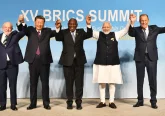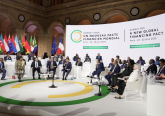
Depending on whom you read, the Angolan government is either run by a band of committed reformists or is in the grip of a villainous, money-hungry elite. Long a critic, the International Monetary Fund now lionises “the significant progress made toward improving fiscal transparency”. Civil society activist Rafael Marques de Morais condemns the relentless self-enrichment by government officials using “their official positions to override the line between public and private interests”. While Angola’s oil economy has never been more transparent, the impact of this on the governance of the country is trivial and even strengthens the regime.
Angola gained notoriety just over a decade ago as an oil-rich country run by an oligarchy lording over an impoverished, war-weary population.
Global Witness and Human Rights Watch published searing investigations of the opaque oil system and the links between Sonangol, the powerful national oil company, and the presidency. The IMF’s technocratic criticism of the country’s finances was never the same as civil society’s attack on corruption. But for a time they seemed aligned. Angola’s battered civil society insisted on pro-poor management of oil monies and western governments normally wedded to oil realpolitik seemed to join the reformist call.
Faced with this unexpected onslaught, the elite nursed theories about a George Soros-inspired conspiracy and took refuge in the language of sovereignty and non-intervention. It made no attempt to join nascent transparency efforts. And it was pitiless when confronted with challenges, as BP found out when its 2001 publication of amounts paid to the government was met with threats of expulsion.
This bellicose stance changed fairly quickly. The government remained dismissive of the Extractive Industries Transparency Initiative and other such multilateral efforts but it moved to implement domestic reforms.
The government started to audit the financial statements of Sonangol; publish accounts on the finance ministry website; hire Ernst & Young to audit public accounts; create a (not yet fully operational) tracking system for managing expenditure; and run a 2006 oil bidding round reported as following industry best practice. Although many assumed that the post-2004 prominence of China would be bad for transparency, these reforms continued apace, especially after the signing of an IMF standby arrangement in 2009.
Why did the government pursue reform and what does it amount to? At a basic reputational level, it realised that some lip service to transparency had to be paid. The old war-era methods also stood in the way of a decent credit rating, Sonangol’s global ambitions and the IMF seal of approval. But the main reason for a homegrown reform agenda was the regime’s acknowledgment that many of the measures suggested were good in their own right and would greatly improve the system’s managerial and technical capacity.
Less predictable innovations were never adopted, while other laws passed with great fanfare were carefully left aside. It never crossed politicians’ minds that they were changing the system: fully understanding the reality of MPLA domination, they were actually doing the opposite. The cherry-picked technical measures amounted to upgrades of the status quo. In particular, the concentration of reform efforts on the revenue side allowed the government to make visible improvements at the top while leaving the expenditure side essentially unreformed and indeed shifting much patronage downwards. Ten years later, the individuals and social groups at the centre of the behaviour denounced by the likes of Global Witness are more empowered, safer and richer than ever.
This shrewd approach of partial implementation won plaudits, to the extent that the IMF now mentions a gaping hole of $32bn in public accounts (recently reduced to “only” $4bn) with a broadmindedness absent from its once biting reports.
It is not just the IMF that has gone soft. Many western states supposedly worried about China’s dealings were among the first to backtrack on reform. And despite Angola’s poor ranking in corruption and ease of doing business surveys, the investors flocking there are mostly content with seeking out partnerships with strongmen of the apparently stable regime. The matter of transparency remains contentious. Recent developments regarding a pre-salt award to US oil company Cobalt International Energy may herald a new era of US regulatory activism with consequences for Angola and other oil-rich states, but it is too soon to tell.
The contribution of the IMF and a number of Angolan technocrats towards macro-economic reform is undeniable. What is missing from the IMF’s assessment is the fact that the reforms have had next to no impact on the elite’s approach to development and the real lives of the poor.
A lesson of the Angolan reform trajectory is self-evident yet frequently forgotten: transparency is merely a means to an end. By itself the transparency agenda is a technocratic exercise that savvy governments can easily game. You can have an oil-rich state tick all the boxes and come out on the other side without this having any implications whatsoever for the nature of governance and broad-based development. Angola’s true transparency battles remain to be fought.
Ricardo Soares de Oliveira is a lecturer in comparative politics at Oxford University.
This post originally appeared as an opinion column in the Financial Times and is republished here with the permissions of the author and the FT. The original column can be found here.







No Comment